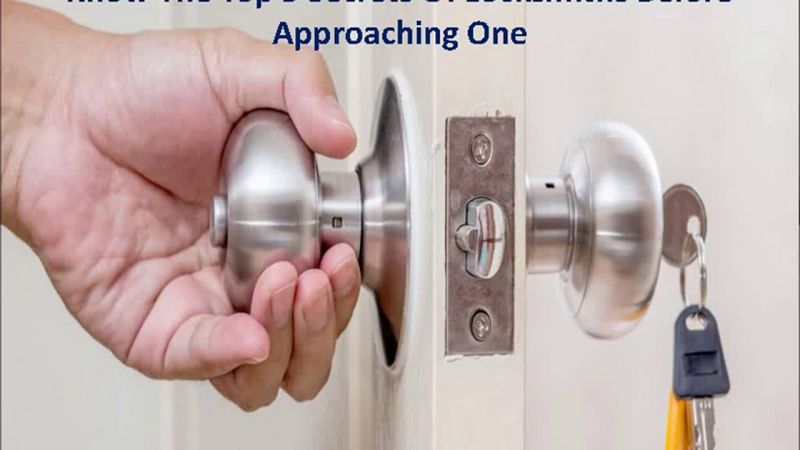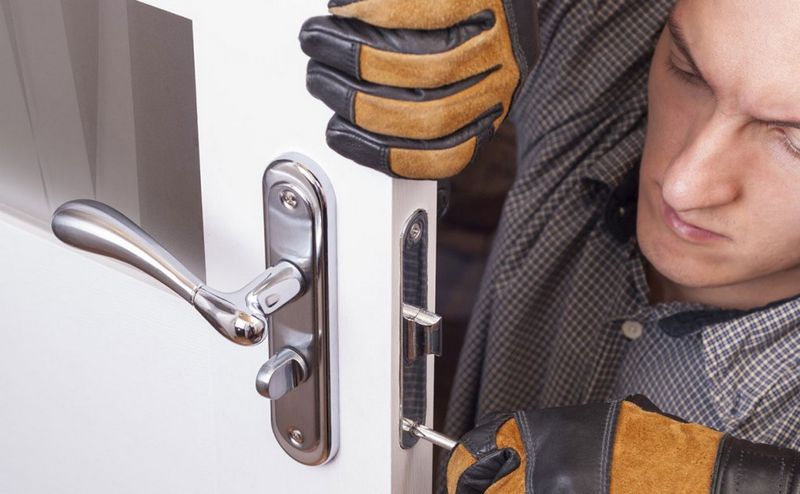
Are locksmiths licensed? – Regulations and trading as a locksmith
Locksmiths play a crucial role in ensuring the security and safety of individuals and their properties. However, not all locksmiths are equal in terms of their knowledge, skills, and expertise. To ensure that you are receiving professional and reliable locksmith services, it is essential to understand the licensing regulations and standards that govern the locksmith industry.
In many countries and jurisdictions, there are specific regulations in place that require locksmiths to be licensed before they can engage in trading. These licensing requirements aim to protect consumers from unscrupulous individuals posing as locksmiths, who may lack the necessary skills or may have malicious intentions.
Obtaining a locksmith license typically involves meeting certain qualifications and passing specified examinations that test the individual’s knowledge and proficiency in various locksmithing techniques. These qualifications and examinations help to ensure that licensed locksmiths possess the necessary skills and expertise to handle a wide range of lock-related issues and provide effective solutions.
When engaging the services of a locksmith, it is important to look for their licensing credentials. Licensed locksmiths are more likely to adhere to industry standards and ethical practices, providing you with peace of mind and assurance that your security needs are in skilled and trustworthy hands. Licensing also serves as a mechanism for accountability, allowing consumers to seek recourse in case of unsatisfactory services or misconduct.
In summary, understanding the licensing regulations and standards for locksmith services is crucial in ensuring that you are hiring a qualified and reliable professional. By opting for a licensed locksmith, you can be confident that your security needs will be met with the highest level of expertise and professionalism, giving you the peace of mind you deserve.
Are locksmiths licensed?
When it comes to hiring a locksmith, it is important to ensure that they are licensed professionals. A licensed locksmith is someone who has met the necessary requirements and is legally permitted to practice as a locksmith. This means that they have undergone the required training, have the necessary skills and knowledge, and operate with a high level of professionalism.
By hiring a licensed locksmith, you can have peace of mind knowing that you are dealing with a trusted and reputable professional. Licensed locksmiths are bound by certain regulations and standards, which helps protect consumers from unscrupulous practices. These regulations typically require locksmiths to undergo background checks, maintain liability insurance, and adhere to specific codes of conduct.
It is important to note that the licensing requirements for locksmiths may vary from one jurisdiction to another. In some areas, locksmiths may need to obtain a specific license or registration to operate legally. Additionally, locksmiths may also be required to hold specialized certifications or memberships in professional trade organizations.
Before hiring a locksmith, it is always a good idea to verify their credentials and ensure that they are licensed to offer their services in your area. This can be done by checking with your local regulatory authority or by asking the locksmith directly for proof of their licensing status.
Overall, choosing a licensed locksmith ensures that you are working with a qualified professional who is committed to providing reliable and trustworthy locksmith services.
Importance of license for locksmiths
Being licensed as a locksmith is of utmost importance when trading as a professional in this field. The regulations and standards set for locksmith services ensure that customers receive quality and reliable work from accredited individuals.
Having a license as a locksmith demonstrates that the individual has undergone the necessary training and has acquired the skills and knowledge needed to perform locksmith services effectively. It assures customers that their needs will be met by a trustworthy and competent professional.
A licensed locksmith is also bound by certain ethical standards and a code of conduct. This ensures that they will abide by ethical practices and provide services that are in the best interest of the customer. It helps build trust and credibility between the locksmith and their clients.
Furthermore, licenses protect both the locksmith and the customer. Licensed locksmiths are insured, which means that any damages or accidents that may occur during the job will be covered. Customers can have peace of mind knowing that they are protected in case of any unforeseen circumstances.
In some jurisdictions, it is illegal to operate as a locksmith without a license. By obtaining a license, locksmiths can avoid legal issues and penalties, ensuring they can continue to offer their services without interruption.
- Obtaining a license as a locksmith is crucial for professionals in this industry. It provides reassurance to clients and ensures that ethical standards are upheld. Having a license also protects both the locksmith and the customer, providing peace of mind to all parties involved.
Regulation of locksmith profession
The locksmith profession is regulated in many countries to ensure that individuals working in this trade are qualified and trustworthy. Licensing is a common requirement for locksmiths to legally operate as professionals in their respective regions.
Being licensed as a locksmith means that the individual has met certain standards and qualifications set by the regulatory authorities. These standards may include education, experience, and passing an examination to prove one’s competency in locksmithing.
In addition to licensing, locksmiths also need to adhere to various regulations imposed by local and national authorities. These regulations may cover aspects such as business practices, advertising, and customer protection. For example, locksmiths may be required to have a physical shop or office, maintain proper records of their work, and provide clear pricing information to customers.
It is important for customers to hire licensed locksmiths as it ensures that they are dealing with professionals who have the necessary skills and knowledge to provide reliable and quality locksmith services. Licensed locksmiths are also more likely to have insurance coverage, providing customers with additional protection in case of any damages or losses.
By regulating the locksmith profession, authorities aim to maintain the integrity and reputation of the trade while protecting the interests of both locksmiths and customers. These regulations help create a level playing field for locksmith businesses and promote fair competition in the industry.
Overall, the licensing and regulations surrounding the locksmith profession play a crucial role in ensuring the provision of reputable and trustworthy locksmith services to the public.
Licensing requirements for locksmiths
In many countries, locksmiths are required to be licensed in order to legally operate their business and provide services to the public. Licensing ensures that locksmiths have met certain standards and qualifications set by the regulatory authorities.
To become a licensed locksmith, individuals typically need to complete a formal training program or apprenticeship in locksmithing. These programs cover topics such as key cutting, lock installation and repair, and security systems. Some programs may also include courses on business practices and customer service skills.
After completing the training program, aspiring locksmiths may need to pass an examination to demonstrate their knowledge and skills in the field. The content and requirements of these exams can vary depending on the jurisdiction and the level of licensure sought.
In addition to the training and examination requirements, locksmiths may also need to meet other regulations and standards to obtain and maintain their license. These may include background checks, proof of insurance, and compliance with specific codes and regulations related to locksmithing.
Once licensed, locksmiths are then allowed to legally carry out their trade, providing services such as lockouts, key duplication, lock repairs, and security consultations. Licensed locksmiths have the knowledge and expertise to ensure the safety and security of their clients’ homes, businesses, and vehicles.
It is important to note that licensing requirements for locksmiths can vary by country, state, or even city. It’s essential for individuals interested in becoming a locksmith or hiring locksmith services to consult the specific regulations and licensing requirements in their area.
Understanding the standards for professional locksmith services
In order to ensure that locksmiths provide reliable and trustworthy services, there are regulations and standards in place. These regulations are designed to protect consumers and to maintain the quality of work performed by locksmiths.
One crucial aspect of these regulations is the requirement for locksmiths to be licensed. Being licensed indicates that a locksmith has met certain criteria and has undergone training and testing to demonstrate their competence.
Locksmiths who are licensed have typically completed an apprenticeship or have obtained a relevant qualification in locksmithing. This ensures that they have the necessary knowledge and skills to perform their work effectively and efficiently.
Additionally, licensed locksmiths are required to adhere to specific codes of conduct and ethical guidelines. This includes maintaining the privacy and security of their clients’ information, as well as providing transparent pricing and honest recommendations.
The licensing process also includes background checks to ensure that individuals working as locksmiths are trustworthy and do not have a criminal history that could pose a risk to the safety of their clients.
Furthermore, licensed locksmiths often need to stay updated on industry advancements and new technologies. This ensures that they can provide the most up-to-date and secure solutions to their clients.
By hiring a licensed locksmith, consumers can have peace of mind knowing that they are receiving services from a professional who meets the necessary standards and regulations set by the industry. This helps to ensure the quality and reliability of the work performed.
When in need of locksmith services, it is important to look for licensed locksmiths who are registered with recognized trade associations or regulatory bodies. This further guarantees that the locksmith has undergone the required training and meets the standards set by the industry.
To summarize, the licensing of locksmiths and the adherence to regulations and standards play a crucial role in maintaining the professionalism and integrity of the locksmithing industry. It is essential for both locksmiths and consumers to understand and comply with these standards in order to ensure the highest level of service and security.
Importance of standards in locksmith industry
In the locksmith industry, standards play a crucial role in ensuring the quality and reliability of professional locksmith services. As locksmiths are trained professionals who provide security solutions for homes, businesses, and vehicles, adhering to regulations and standards is of utmost importance.
One of the key reasons why standards are important in the locksmith industry is to ensure the safety and security of individuals and their property. By following established regulations, licensed locksmiths can provide services that meet industry standards and prioritize the protection of their clients.
Standards also help to maintain consistency in the locksmith industry. They define the minimum requirements and level of expertise that locksmiths must possess. This promotes a level playing field among locksmiths and ensures that customers can expect a certain level of quality and professionalism from any licensed locksmith they choose to hire.
Additionally, standards help to build trust and credibility in the locksmith profession. When locksmiths meet industry standards, it demonstrates their commitment to the highest level of service and professionalism. Customers feel more confident and at ease when hiring licensed locksmiths who adhere to these standards.
Furthermore, standards also provide guidelines for continuous improvement and innovation in the locksmith industry. By staying up-to-date with the latest technologies, techniques, and best practices outlined in industry standards, locksmiths can enhance their skills and offer cutting-edge solutions to their clients.
In conclusion, the importance of standards in the locksmith industry cannot be overstated. Regulations and standards ensure the safety, consistency, trustworthiness, and growth of the profession. As customers, it is crucial to choose licensed locksmiths who adhere to these standards to guarantee the best possible service and protection for your property.
Key standards for professional locksmith services

In order to ensure the quality and professionalism of locksmith services, it is important for locksmiths to adhere to certain standards. One of the most important standards is being licensed.
Being licensed means that a locksmith has met certain criteria and has been approved by the appropriate regulatory body. This is essential as it ensures that the locksmith has the necessary skills and knowledge to provide reliable and trustworthy services to their customers.
Licensing also helps to protect consumers from unscrupulous individuals who may not have the proper training or qualifications to perform locksmith services. By choosing a licensed locksmith, customers can have confidence that they are dealing with a legitimate and reputable professional.
In addition to being licensed, locksmiths should also comply with the regulations and guidelines set forth by the industry. These regulations may include proper business practices, ethical conduct, and adherence to safety standards. By following these regulations, locksmiths can provide their services in a professional and responsible manner.
Another key standard for professional locksmith services is the use of quality materials and the latest tools and technology. Locksmiths should stay up to date with the latest advancements and trends in the industry to ensure that they can provide the most effective and efficient services to their customers.
Lastly, locksmiths should also be dedicated to ongoing learning and professional development. By staying educated and continuously improving their skills, locksmiths can stay ahead of the curve and offer the best solutions to their customers.
Compliance with industry standards
When it comes to trading in the locksmith industry, it is important for locksmiths to be properly licensed. Licensing ensures that locksmiths meet certain requirements and standards set by regulatory bodies, ensuring that they are qualified to provide professional locksmith services.
A licensed locksmith has undergone the necessary training and education to develop the skills and knowledge needed to perform their job effectively. This includes understanding different types of locks, mechanisms, and security systems, as well as knowing the best practices for installation, maintenance, and repair.
In addition to obtaining a license, locksmiths must also comply with various regulations and standards set by governing bodies. These regulations are in place to protect customers and ensure that locksmiths adhere to ethical and professional practices.
By complying with industry standards, licensed locksmiths provide peace of mind to their customers. They can be trusted to handle their locksmith needs with integrity and professionalism, knowing that they have the necessary skills and knowledge to meet their requirements.
Furthermore, compliance with industry standards also helps maintain a high level of quality and consistency within the locksmith profession. It ensures that all locksmiths are held to the same set of standards, further building trust and credibility in the industry.
So, when choosing a locksmith, it is essential to verify their licensing and inquire about their compliance with industry standards. This will help ensure that you receive reliable and professional locksmith services that meet your needs.
Benefits of hiring a licensed locksmith
Hiring a licensed locksmith brings several advantages and ensures that you receive professional, reliable, and trustworthy services. Here are a few benefits of choosing a licensed locksmith:
Expertise and Knowledge: Licensed locksmiths undergo extensive training and must meet specific requirements to acquire their license. This means that they have the necessary knowledge and expertise to handle various lock and key issues. Whether it’s fixing a broken lock, installing a new security system, or providing emergency lockout services, a licensed locksmith has the skills to get the job done efficiently.
Trustworthiness and Reliability: Licensed locksmiths are bound by a set of trading regulations and standards that they must adhere to. These regulations ensure that they operate ethically, maintaining the highest level of professionalism and integrity. Therefore, when you hire a licensed locksmith, you can trust that they will act in your best interest and provide a reliable service.
Insurance Coverage: Licensed locksmiths often carry insurance coverage that protects both themselves and their clients. This means that in the unlikely event of damage or loss during the locksmith’s work, you are covered. This insurance provides peace of mind and protects you from any unforeseen expenses that may arise from the locksmith’s actions.
Quality Workmanship: Licensed locksmiths are committed to providing quality workmanship. They use premium tools and equipment and follow industry best practices to ensure that the job is done right the first time. With their expertise and attention to detail, licensed locksmiths can deliver excellent results and offer a higher level of service compared to unlicensed individuals.
Continued Professional Development: Licensed locksmiths are required to stay up to date with the latest advancements in the industry. They participate in ongoing training and education programs to enhance their skills and knowledge. By hiring a licensed locksmith, you can be confident that you are employing a professional who is familiar with the latest technologies and techniques in locksmithing.
In conclusion, hiring a licensed locksmith provides numerous benefits. From their expertise and trustworthiness to insurance coverage and quality workmanship, a licensed locksmith ensures that you receive top-notch service and peace of mind. When it comes to securing your home or business, it’s always a wise decision to choose a licensed locksmith.
Expertise and knowledge
Professional locksmiths are required to have a deep understanding of the regulations and standards governing their trade. They must be licensed in order to legally operate as a locksmith and provide their services to the public.
In order to obtain a license, locksmiths typically have to undergo specific training and pass an examination that demonstrates their expertise in the field. This ensures that they have the necessary knowledge and skills to effectively perform the tasks associated with locksmithing, such as repairing locks, installing security systems, and providing emergency lockout assistance.
By being licensed, locksmiths are held to certain standards and are subject to regulations that are designed to protect consumers. This includes adhering to ethical guidelines and maintaining a level of professionalism in their work. Licensing also helps to prevent unqualified individuals from trading as locksmiths, thereby ensuring that those who provide locksmith services have the necessary skills and expertise.
When hiring a locksmith, it is important to verify their license and ensure that they are compliant with all relevant regulations. This will help to ensure that you are receiving services from a qualified professional who is knowledgeable and experienced in their trade.
Trustworthiness and reliability
When it comes to locksmiths trading as professionals, trustworthiness and reliability are of the utmost importance. In order for customers to feel confident in the services provided by a locksmith, it is essential that they are licensed and regulated. Licensed locksmiths adhere to strict standards and regulations, ensuring that their work is performed to a high level of quality and integrity.
The licensing process typically involves background checks and verification of qualifications, allowing customers to trust that the locksmith they are working with is trustworthy and reliable. Licensed locksmiths are held accountable for their actions and are required to maintain a certain level of professionalism.
By choosing a licensed locksmith, customers can feel confident that they are receiving services from a professional who has met the necessary requirements and has been vetted by the appropriate authorities. This provides peace of mind knowing that the locksmith is competent and trustworthy.
Regulations and licensing demonstrate a commitment to maintaining standards within the locksmith industry. Trustworthiness and reliability are the foundation of a successful locksmith business, and by choosing a licensed locksmith, customers can ensure that they are receiving services from a reputable and reliable professional.
Accountability and recourse
As trading professionals, licensed locksmiths are bound by regulations that ensure they adhere to certain standards in their practice. These regulations help protect consumers from unscrupulous or unqualified locksmiths and ensure that locksmiths provide reliable and trustworthy services.
When hiring a licensed locksmith, you can have peace of mind knowing that there are measures in place for accountability and recourse if something goes wrong. Licensed locksmiths are required to maintain records of their work and adhere to specific codes of conduct. In the event of any issues or disputes, you have the ability to file a complaint or seek recourse through the appropriate channels.
Furthermore, licensed locksmiths are typically insured, which provides an additional layer of protection for both the locksmith and the consumer. In the rare event of any damages or losses occurring during the locksmith’s work, the insurance coverage can provide compensation and resolution.
Overall, the licensing requirements for locksmiths help ensure that they are held accountable for their actions and provide a higher level of professionalism and reliability. It is always recommended to hire a licensed locksmith to ensure that you receive quality service and have recourse in case anything goes wrong.
Questions and answers:
Do locksmiths need to have a license?
Yes, in most countries and states, locksmiths are required to have a license in order to operate legally.
What are the requirements for obtaining a locksmith license?
The requirements for obtaining a locksmith license vary depending on the jurisdiction. However, in general, locksmiths are required to complete a formal training program and pass a background check before they can obtain a license.
Can anyone become a locksmith without a license?
No, it is illegal to operate as a locksmith without a license in most areas. Unlicensed locksmiths are often considered to be operating illegally and may not have the necessary skills or knowledge to provide professional locksmith services.
How can I check if a locksmith is licensed?
You can check if a locksmith is licensed by contacting the regulatory agency or licensing board in your jurisdiction. They should be able to provide you with information about the locksmith’s licensing status.
Why is it important to hire a licensed locksmith?
Hiring a licensed locksmith ensures that you are working with a professional who has met the necessary requirements and standards for providing locksmith services. Licensed locksmiths are more likely to have the necessary knowledge and skills to handle your locksmith needs effectively and securely.
Are locksmiths required to be licensed?
Yes, in many states and countries locksmiths are required to be licensed. The specific requirements and regulations vary depending on the location, but in general, locksmiths need to pass exams and meet certain criteria to obtain a license.
What are the benefits of hiring a licensed locksmith?
Hiring a licensed locksmith ensures that you are getting a professional who has met the necessary standards and qualifications. Licensed locksmiths are typically more trustworthy and reliable, as they have undergone the necessary training and background checks.



